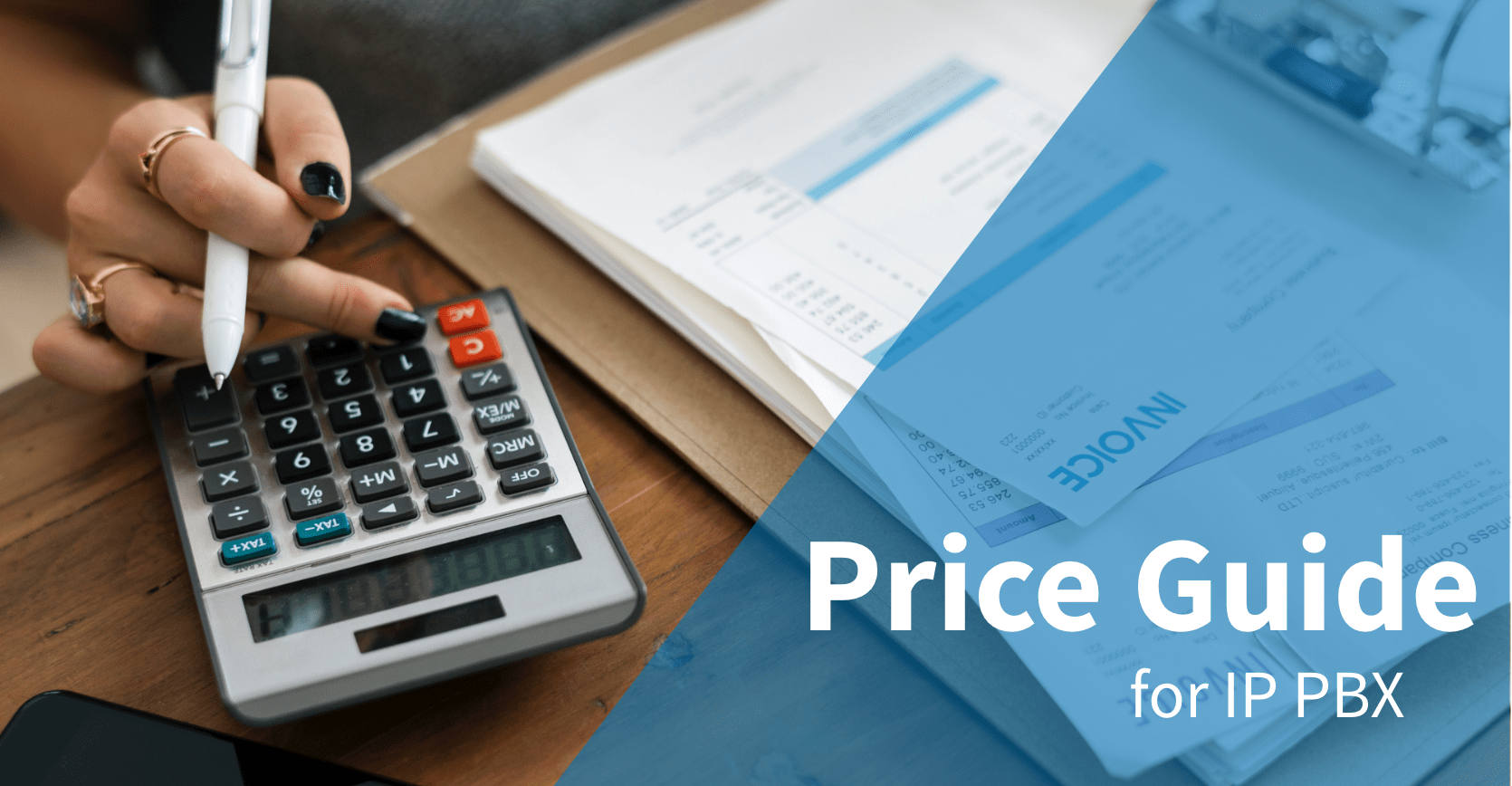[Price Guide] IP PBX

The Internet continues to change industries around the world, and telecom is no exception. Virtual connections to the cloud are rapidly replacing traditional phone line. VoIP (Voice over Internet Protocol) is now the primary communication technology used by companies around the world. A VoIP system takes media streams (such as a phone call), packetizes it, and transmits the data over a digital network using an IP PBX (Internet Protocol Private Branch Exchange). While VoIP usually refers to voice data, the technology works for other multimedia sessions like email, fax, SMS, video conferencing and more.
Related: Looking to make the switch to an affordable, effective PBX system?
IP PBX Systems
The primary benefit of adopting an IP PBX system comes from reduced costs. IP telephony provides less expensive local and international call rates than a traditional phone line. On top of that, there is little to no hardware to maintain and your system is highly scalable. Plus, improved access to call analytics and reports makes it easier to optimize your business practices. In this article, we’ll explain the basics of an IP PBX setup and key factors to review when considering costs.
Understanding IP PBX Technology
Business VoIP providers deliver services to their customers by setting up an IP PBX, or Private Branch Exchange. Traditional PBX systems require separate networks to communicate voice and data. An IP PBX converges voice and data networks, so a single line can provide Internet, VoIP, and traditional telephone communications.
That convergence also makes data storage more efficient and robust by connecting your networks to the cloud. Standard IP phone systems allow businesses to handle calls between VoIP users, a VoIP user and a traditional telephone line user, as well as two traditional telephone line users. Your IP telephony provider manages your system, routes your calls, and personalizes your service through a dedicated or shared server connected to the cloud.
IP PBX Pricing
Customizable to all types of setup requirements and limitations, you determine your IP PBX system setup. Your choices include establishing a standalone IP phone system or integrating with your current PBX. Three categories of IP phone system setups cover most scenarios.
- Hosted IP PBX: your provider hosts and manages your PBX as a service from a remote location or in the cloud. The benefit is that maintenance and upgrades come with the service from your provider.
- On-premises PBX System: your onsite PBX requires regular updates and maintenance for which you are responsible. Current hardware typically supports IP phones and the call server supports IP signaling and network routing.
- Hybrid IP PBX System: some providers (AVOXI is one) integrate with your on-premise PBX hardware or your hosted PBX to provide VoIP services for your local and toll free virtual numbers. This integration may require VoIP gateway hardware. Most integrations simply forward to a SIP trunk or IP address.
Which IP PBX Setup is Best for You?
As mentioned above, there are three types of PBX solutions. Let us dig a little deeper to better understand the cost implications of each.
Hosted IP PBX
- Most providers offer different service packages to satisfy a variety of business needs.
- Essential business phone system features are typically included at all service levels. Some providers charge for advanced add-on features.
- Provider handles upgrades and maintenance.
- Computers with headsets, IP phones, and softphones replace the standard desk phone.
- Remote access and remote employees are supported anywhere there is an Internet connection.
- Most providers include configuration, onboard training, and continued technical support, reducing the need for a dedicated employee to manage your system.
- A wide variety of plans are available including bundled packages, unlimited plans and monthly subscriptions.
- Prices range from $14.99 per user and up depending on the services and geographies. Generally, voice usage charges are extra. Discounts are typically available for paying for a year versus by month.
Compare cost, coverage, and services with select IP telephony providers to determine the best fit for your business needs. Exact pricing depends on your specific requirements.
On-Premises PBX System
- System capacity and available ports determine if the PBX is sufficient to handle VoIP service.
- Newer PBX systems usually have an IP port or CTI (computer-telephony integration) for VoIP service installation.
- On-premise systems, typically require a dedicated technical employee or an outsourced support vendor to manage.
- For companies with 40 or more employees, an on-premise PBX is sometimes a viable option.
- Consider the cost on ongoing maintenance and upgrades.
- Standard costs for an on-site PBX system range from $500 to $1000 per user.
Frequently adding features to your phone system means additional charges with every upgrade or addition. And, costs and scheduling for third party services to implement also can factor into overall investment. In addition, your phone numbers come from a virtual number provider and have separate monthly subscription and usage charges.
Hybrid IP PBX System
- Hybrid systems integrate a traditional PBX with an updated IP phone system.
- Incorporating an analog system typically requires a VoIP gateway or IAD (Integrated Access Device) connected to a port on your system’s server.
- A gateway solution allows you to continue with a current phone system while adding additional IP telephony features with new virtual numbers.
- Monthly pricing for IADs vary widely and can have significant setup fees. Monthly subscription fees range from $120 to $450. Setup fees generally range between $100 and $375.
- Alternatively, your VoIP provider can forward virtual numbers to a SIP address or phone number. An analog PBX likely needs an IAD/gateway to accept the SIP address.
Before deciding on a hybrid system, it is best to get several recommendations and quotes from VoIP service specialists. Many VoIP providers do not offer a full array of system integrations. You should be as specific as possible in what you require from your business PBX.
Other Factors Affect IP PBX System Cost
When making the decision to switch to a VoIP phone system, there are a few other factors to keep in mind.
- Document your business needs. This includes information like expected call volumes, call destinations, where you receive calls or would like to receive calls, and your internet bandwidth limitations, expected business growth, etc.
- Remember that IP telephony relies on quality Internet access. Take an honest quality assessment of your existing Internet routers. High speed (10Mbps+) cable or fiber-based Internet speed is recommended to get the most out of your IP PBX. Wireless and satellite Internet services have limitations when supporting voice quality.
- Be aware of additional costs. Account for setup fees, maintenance costs, add-on features, and future upgrades when deciding on an IP telephony provider.
As cloud telephony continues to advance, IP phone service evolves as a cost-effective, flexible, and secure alternative to traditional PBX systems.
Contact an AVOXI IP PBX specialist to discuss your requirements and get a free quote customized to your needs.


